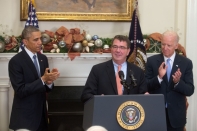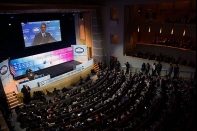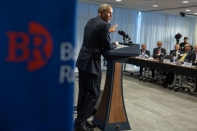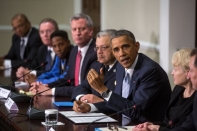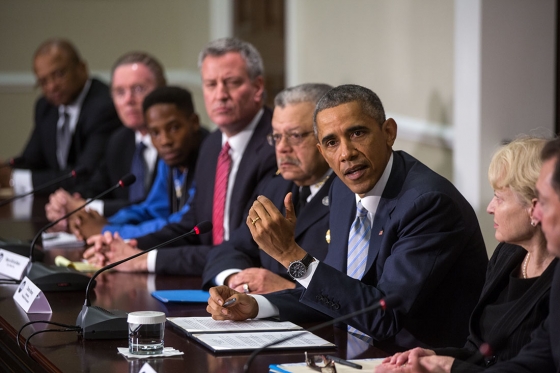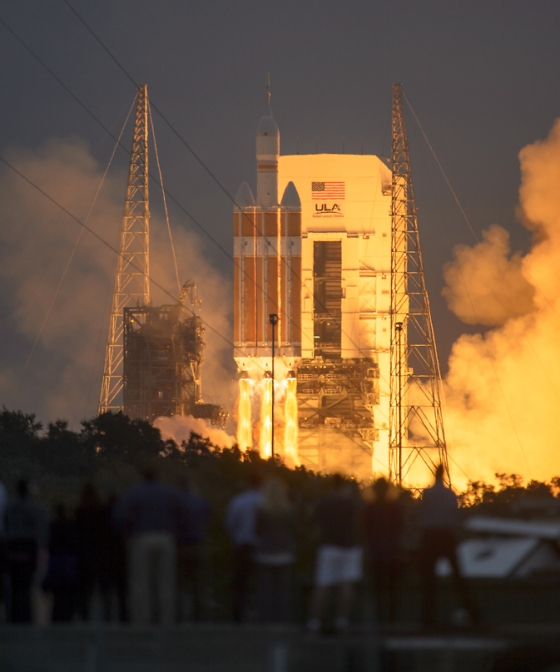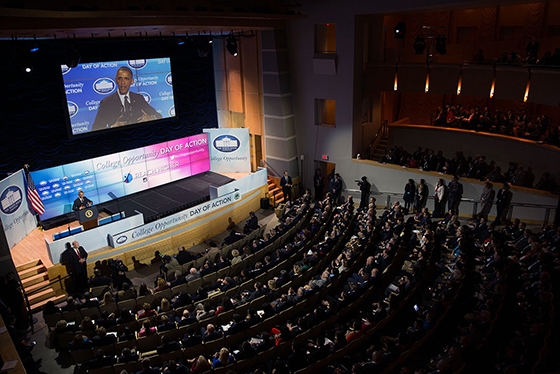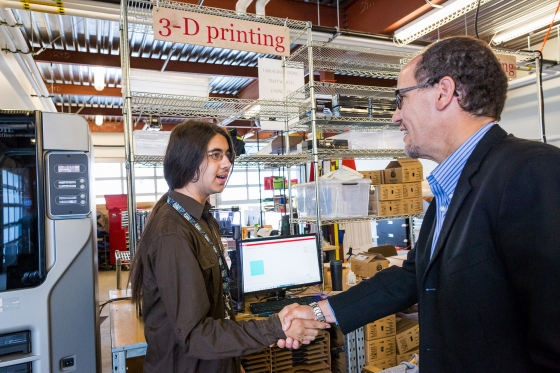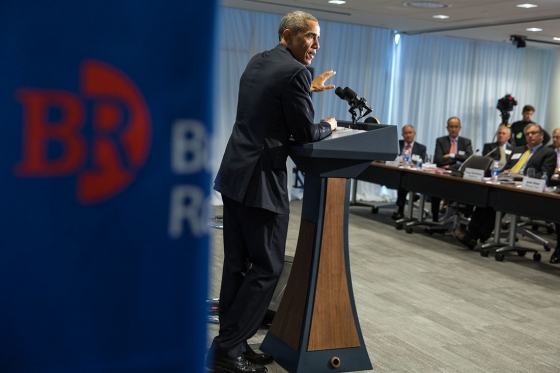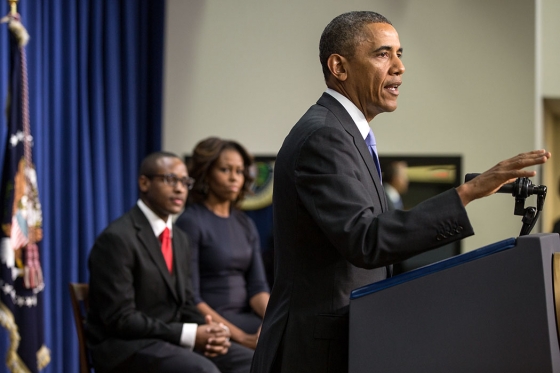Thank You
For your submission
-

"His mother and I would have had to make the very cold calculation: Do we spend our own retirement savings on his medical care trying to extend his life, or do we cast him adrift to save what we can for our own later years?
Because, what company would have ever insured him without the ACA? Not one."
In March of 2013, Don and his family were dealt a devastating blow. His son Daniel, a hardworking 35-year-old, was diagnosed with brain cancer and had to have a tumor removed. Thankfully, he was covered by employer-sponsored health so his insurance covered most of the costs for his hospitalization, the surgery, radiation therapy, chemotherapy, and diagnostic MRI imaging. His medical care costs far exceeded $200,000, so Don and his family were grateful for the coverage.
But this May, Daniel lost his job -- the consequences of the cancer and operation make employment impossible for him. Don's family would have been forced to continue a very expensive coverage option available to unemployed workers for a limited time had it not been for the Affordable Care Act.
The Affordable Care Act prohibits insurance companies from discriminating against people with pre-existing conditions and provides affordable and quality coverage on the Health Insurance Marketplaces. And thanks to the ACA, Don was able to help his son sign up for a subsidized plan on the Marketplace that will pay 94% of his medical expenses, for a monthly premium of $45.
Need to get covered? Find a health plan that best fits your needs at HealthCare.gov. Already covered? Commit to help someone you know get covered here.
-
December 05, 2014
05:16 PM ESTIt's been a busy week here at the White House. In case you've missed some of our top stories this week, here's a recap.
A Plan to Build Trust Between Communities and Local Police
Recent events in Ferguson, Missouri and around the country have highlighted the importance of strong, collaborative relationships between local police and the communities that they protect.
That’s why on Monday, President Obama announced new steps that we’re taking to strengthen the relationship between law enforcement agencies and the communities that they are obligated to protect and serve. Take a look at some of the steps we’re taking below:

-
This morning, President Obama announced his nomination of former Deputy Secretary of Defense Ashton Carter to be the next U.S. Secretary of Defense. Carter has been in public service for more than 30 years, and has served in various positions under 11 Secretaries of Defense.
"Ash is rightly regarded as one of our nation’s foremost national security leaders," the President said in today's remarks. "As a top member of our Pentagon team for the first five years of my presidency, including his two years as deputy secretary, he was at the table in the Situation Room; he was by my side navigating complex security challenges that we were confronting. I relied on his expertise, and I relied on his judgment."
-
Ed. note: This post is written by NASA's Steven Siceloff. You can read the original post here.
NASA marked a critical step on the journey to Mars with its Orion spacecraft during a roaring liftoff into the dawn sky over eastern Florida on Friday, Dec. 5, 2014, aboard a Delta IV Heavy rocket.
Once on its way, the Orion spacecraft accomplished a series of milestones as it jettisoned a set of fairing panels around the service module before the launch abort system tower pulled itself away from the spacecraft as planned.
The spacecraft and second stage of the Delta IV rocket settled into an initial orbit about 17 minutes after liftoff. Flight controllers put Orion into a slow roll to keep its temperature controlled while the spacecraft flew through a 97-minute coast phase.
The cone-shaped spacecraft did not carry anyone inside its cabin but is designed to take astronauts farther into space than ever before in the future.
Orion's first flight test is expected to be one for the books: the first mission since Apollo to carry a spacecraft built for humans to deep space, the first time NASA's next-generation spacecraft is tested against the challenges of space, and the first operational test of a heat shield strong enough to protect against 4,000-degree temperatures.
-
Job growth in November was strong, and the economy has now already added more jobs in 2014 than in any full calendar year since the late 1990s. To create an environment in which this progress can continue, it is critical that Congress take the basic steps needed to fund the government and avoid creating disruptive and counterproductive fiscal uncertainty. We have an opportunity to work together to support the continued growth of higher-paying jobs by investing in infrastructure, reforming the business tax code, expanding markets for America’s goods and services, making common sense reforms to the immigration system, and increasing the minimum wage.
FIVE KEY POINTS IN TODAY’S REPORT FROM THE BUREAU OF LABOR STATISTICS
1. The private sector has added 10.9 million jobs over 57 straight months of job growth, extending the longest streak on record. Today we learned that total nonfarm payroll employment rose by 321,000 in November, mainly reflecting a 314,000 increase in private employment—the third strongest month for private payrolls over the past 57 months. Private-sector job growth was revised up for September and October by a combined 32,000, so that over the past three months, private-sector job growth has averaged 266,000 per month. Private employment has risen by at least 200,000 for ten consecutive months, the first time that has happened since the 1990s. In addition, the average workweek in the private sector rose to 34.6 hours in November, the highest since 2008.
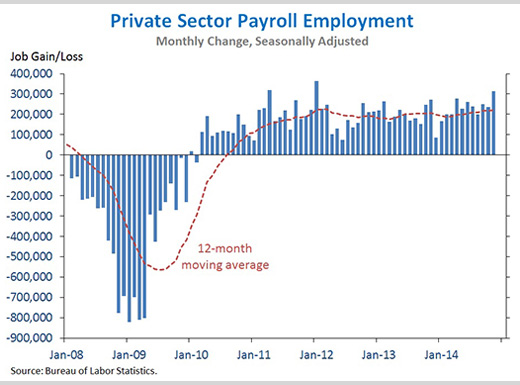
-
Eighteen months after the Senate passed a comprehensive, commonsense bill on immigration reform with bipartisan support; House Republicans still don’t have a plan to fix our broken system. Instead, House Republicans passed a bill this week that intends to reverse steps the President took to hold undocumented immigrants accountable and prioritize our safety as a nation. Those who voted “yes” for the proposal voted to prevent millions of undocumented immigrants from undergoing national security and criminal background checks, and make it more difficult for them to pay taxes. Those who voted “yes” voted to go back to a system where immigration officials don’t prioritize deporting criminals and terrorist threats, which would also tear apart millions of immigrant families -- many of whom have been living here for decades.
On November 20th, President Obama announced immigration accountability executive actions that will better secure our border, hold potentially more than 4 million undocumented immigrants accountable, and ensure that everyone plays by the same rules and pays their fair share of taxes. These actions will allow undocumented immigrants who have resided in the United States for at least five years, are parents of U.S. citizens or lawful permanent residents, and are non-priorities for removal to seek temporary immigration relief, on a case-by-case basis, by registering, passing background checks, and getting right with the law. These actions would also give additional DREAMers the opportunity to request immigration relief through the existing Deferred Actions for Childhood Arrivals (DACA) policy.

-
This week, the President got a head start on his Small Business Saturday shopping, took action to build trust between communities and local police, got a firsthand look at the ground-breaking scientific research behind the American-made Ebola vaccine candidate now in clinical trials, hosted the annual Tribal Nations Conference and the second-ever College Opportunity Summit, and last but not least, helped light the National Christmas Tree. That's November 28th to December 4th or, "Multiparameter Flow Cytometer.
-
The key to success in today’s economy is higher education, which is why expanding opportunity for more students to enroll and succeed in college, especially low-income and underrepresented students, is vital to building a strong middle class.
Earlier today, President Obama, Vice President Biden, and First Lady Michelle Obama joined college presidents and education leaders from around the country to announce 600 new actions to help more students prepare for and graduate from college.
President Obama talked about how our higher education system is one of the things that makes America exceptional:
There’s no place else that has the assets we do when it comes to higher education. People from all over the world aspire to come here and study here. And that is a good thing.
America thrived in the 20th century because we made high school free. We sent a generation to college. We cultivated the most educated workforce in the world. Along with our innovation mentality, our risk-taking, our entrepreneurial spirit, it was that foundation that we laid -- broad-based, mass education -- that drove our economy and separated us from the rest of the world.
-
December 04, 2014
07:08 PM EST'Tis the season of holiday cheer here at the White House. Today, the 2014 National Christmas Tree Lighting took place on the Ellipse at the President’s Park, one of America’s 401 national parks. The event is presented by the National Parks Service and National Parks Foundation. This year’s ceremony was hosted by none other than Tom Hanks and Rita Wilson. Performances included Fifth Harmony, Patti LaBelle, Steve Miller, and much more.
"Merry Christmas, everybody!" —President Obama at @TheNationalTree lighting: http://t.co/YGWioTu61s #WHHolidays
— The White House (@WhiteHouse) December 4, 2014
-
Ed. note: This was originally posted on the U.S. Department of Labor's blog yesterday. See the original post here.
When President Obama made his first trip to Indian Country earlier this year, he told a compelling story about the impact federal investment and partnerships have in tribal communities. So I was privileged today to participate in the President’s sixth White House Tribal Nations Conference. Because of the challenges tribal communities continue to face with high rates of unemployment and barriers to opportunity, the conference was an important chance to discuss the Department of Labor and Administration’s efforts to create shared prosperity in Indian Country – and to hear from tribal leaders directly about their ideas for expanding and improving our work.
-
In June 2012, the world missed a deadline, without fanfare and without public outcry: Eighty percent of countries failed to meet the global timeline to be prepared to battle biological threats like Ebola.
Two years, thousands of lives, and billions of dollars later, most countries still don't have in place all the capacity they need to prevent Ebola from spreading or other biological threats from igniting. Consequently, we don't have in place the global system we need — the smoke alarm — to alert us when an outbreak flares.
The United States developed and launched the Global Health Security Agenda to establish urgently the system required to prevent, detect, and rapidly extinguish outbreaks before they become epidemics, starting in the most vulnerable nations. This lack of preparedness is an emergency — it extends beyond West Africa, and we have asked Congress for the funding we need to start now in the most vulnerable nations.
-
Earlier today, President Obama spoke with Business Roundtable, a group of CEOs of some of the country's leading companies, at an event in Washington, D.C.
The President discussed where our economy and our country stand, as well as the challenges and opportunities ahead:
Around this time six years ago, America’s businesses were shedding about 800,000 jobs per month. Today, our businesses, including some of the most important businesses in the world that are represented here today, have created over 10.6 million new jobs; 56 months of uninterrupted job growth, which is the longest private sector job growth in our history. We just saw the best six-month period of economic growth in over a decade. For the first time in six years, the unemployment rate is under 6 percent.
All told, the United States of America, over the last six years, has put more people back to work than Europe, Japan, and the rest of the advanced world combined. And that's a record for us to build on.
-
Ed. Note: This post was updated on December 4, 2014.
Yesterday, a grand jury in Staten Island decided not to bring criminal charges against police officers involved in the tragic death of Eric Garner.
Speaking at the 2014 White House Tribal Nations Conference yesterday evening, President Obama delivered the following statement:
"Some of you may have heard there was a decision that came out today by a grand jury not to indict police officers who had interacted with an individual with Eric Garner in New York City, all of which was caught on videotape and speaks to the larger issues that we’ve been talking about now for the last week, the last month, the last year, and, sadly, for decades, and that is the concern on the part of too many minority communities that law enforcement is not working with them and dealing with them in a fair way.
"And there’s going to be, I’m sure, additional statements by law enforcement. My tradition is not to remark on cases where there may still be an investigation. But I want everybody to understand that this week, in the wake of Ferguson, we initiated a task force whose job it is to come back to me with specific recommendations about how we strengthen the relationship between law enforcement and communities of color and minority communities that feel that bias is taking place; that we are going to take specific steps to improve the training and the work with state and local governments when it comes to policing in communities of color; that we are going to be scrupulous in investigating cases where we are concerned about the impartiality and accountability that’s taking place.
"And as I said when I met with folks both from Ferguson and law enforcement and clergy and civil rights activists, I said this is an issue that we’ve been dealing with for too long and it’s time for us to make more progress than we’ve made. And I’m not interested in talk; I’m interested in action. And I am absolutely committed as President of the United States to making sure that we have a country in which everybody believes in the core principle that we are equal under the law.
"So I just got off the phone with my Attorney General, Eric Holder. He will have more specific comments about the case in New York. But I want everybody to know here, as well as everybody who may be viewing my remarks here today, we are not going to let up until we see a strengthening of the trust and a strengthening of the accountability that exists between our communities and our law enforcement.
"And I say that as somebody who believes that law enforcement has an incredibly difficult job; that every man or woman in uniform are putting their lives at risk to protect us; that they have the right to come home, just like we do from our jobs; that there’s real crime out there that they’ve got to tackle day in and day out -- but that they’re only going to be able to do their job effectively if everybody has confidence in the system.
"And right now, unfortunately, we are seeing too many instances where people just do not have confidence that folks are being treated fairly. And in some cases, those may be misperceptions; but in some cases, that’s a reality. And it is incumbent upon all of us, as Americans, regardless of race, region, faith, that we recognize this is an American problem, and not just a black problem or a brown problem or a Native American problem.
"This is an American problem. When anybody in this country is not being treated equally under the law, that’s a problem. And it’s my job as President to help solve it."
Later that evening, Attorney General Eric Holder announced that the Department of Justice will proceed with a federal civil rights investigation into Mr. Garner's death. The Attorney General made the following statement:
-
December 03, 2014
05:06 PM ESTNew data out today from the Office of the Actuary at the Centers for Medicare and Medicaid Services confirmed that 2013 was another year of historically slow growth in health care spending and that 2011, 2012, and 2013 saw the slowest growth in real per capita health care spending on record. Today’s data make it increasingly clear that the recent slow growth in the cost of health care reflects more than just the 2007-2009 recession and its aftermath, but also structural changes in our health care system, including reforms made in the Affordable Care Act. As we have noted previously, if even a portion of the recent slowdown continues, the benefits for Federal and State budgets, families’ budgets, and the economy as a whole will be dramatic.
The remainder of this blog post takes a closer look at today’s report and what it can tell us about the drivers of recent trends. We also take a look ahead at 2014 using other data that are already available. Available data suggest that aggregate spending may be growing more quickly as millions of people gain health insurance coverage and access needed care. But the available data also show that health care prices, premiums, and per-enrollee costs—the factors that determine the costs families face—have continued to grow very slowly during 2014.
-
December 03, 2014
02:03 PM ESTThe halls of the White House are decked out with festive holiday décor and the White House Christmas tree stands tall in the Blue Room.
This year, innovative technologies like 3D printing are playing a role in creating a unique and interactive holiday experience at the White House.
In October, the White House announced the 3D Printed Ornament Challenge in partnership with the Smithsonian. Makers, innovators and students around the country, from New Hampshire and Texas to California and Michigan, submitted more than 300 creative, whimsical and beautiful winter-inspired designs. Twenty innovative designs were chosen as finalists and five of these designs were selected for display in the White House.
-

Ed. note: This is cross-posted on the U.S. Department of Labor's blog. See the original post here.
I’ve been involved in civil rights work for a long time, and I’ve seen a lot of victories and setbacks. But in recent years, the speed of our progress on equality for lesbian, gay, bisexual and transgender Americans has been nothing short of astonishing. The Labor Department has played an important role in that progress, and I’m proud to continue it today.
Today, we are issuing a rule to implement Executive Order 13672, which was signed by President Obama in July, to ensure that federal contractors and subcontractors do not discriminate against employees or applicants based on their sexual orientation or gender identity. As the president put it: “Americans ought to be judged by one thing only in their workplaces: their ability to get their jobs done.”
The federal government should be a model employer, leading and not lagging on these issues. Today’s announcement confirms that the federal contracting system will no longer subsidize exclusion and discrimination.
-
Yesterday, Attorney General Eric Holder sent the following message to the White House email list, giving an update on the Administration's next steps following the events in Ferguson, Missouri.
Didn't get the email? Sign up for email updates here.
Following Michael Brown's tragic death, millions of people across the nation and around the world have focused their attention on unfolding events in Ferguson, both grieving together and making their voices heard.
In recent days, many have been captivated by ongoing developments, anguished emotions, peaceful protests -- and, too often, deeply unfortunate images of unnecessary destruction. And this tragic incident has sparked a necessary, national conversation about the need to ensure trust and build strong relationships between law enforcement officials and the communities they serve.
Events in Ferguson have revealed a deep distrust between a community and its police force. But this reality is not limited to one location. Other communities around this country know this struggle all too well. And it's abundantly clear that every single one of us has a role to play in tackling this problem together, as a nation -- to identify those things that bind us, and to be honest with one another about the things that continue to divide us.
In August, President Obama ordered a review of federal funding and programs that provide equipment to state and local law enforcement agencies. On Monday, the Administration released that review's findings -- and announced key next steps to strengthen the trust in and effectiveness of the policing of our communities.
Learn more about Monday's announcements, and the findings of the Administration's review.
Here are the next steps we're taking:
- Creating a new task force to promote the expansion of 21st century community-oriented policing.
- Reforming how the federal government equips local law enforcement, particularly with military-style equipment.
- Advancing the use of body-worn cameras and promoting proven community policing initiatives.
-
Deep, persistent drought. Longer, fiercer wildfire seasons. High tides flooding downtowns. Severe storms wreaking havoc. This is the picture from the front lines of climate change — in communities across America.
And as they face these immediate climate crises, cities, towns, counties, and tribes of every size and in every region of the country have stepped up to be part of the solution: identifying their vulnerabilities, cutting carbon pollution, creating jobs by investing in clean energy and energy efficiency, and finding innovative solutions to make their communities and infrastructure more resilient to climate extremes.
Today, in recognition of their strong commitment to the fight against climate change, the Obama administration is naming 16 of these communities as the first class of Climate Action Champions.
-
At the beginning of his administration, President Obama set a goal that the U.S. would once again lead the world in college graduates. The President believes that expanding opportunity for more students to enroll and succeed in college is vital to building a strong economy and a strong middle class.
The President has already taken important steps to increase college access, including:
- Increasing Pell scholarships by $1,000 a year
- Creating the American Opportunity Tax Credit, worth up to $10,000 over four years of college
- Limiting student loan payments to 10 percent of income
- Laying out an ambitious agenda to reduce college costs and promote innovation and competition
In January, 140 college presidents and other leaders made commitments to support student success at the first White House College Opportunity Summit. To build upon the success of that summit, on Thursday, December 4, President Obama and the First Lady will join college presidents and other leaders making new commitments to improve degree completion, sustain community collaborations that encourage college-going, train high school counselors as part of the First Lady’s Reach Higher initiative, and produce more STEM graduates with diverse backgrounds.
Here’s how you can participate in the College Opportunity Summit on Thursday, December 4th:
-
President Obama visited the Naitonal Institutes of Health (NIH) today to visit the team of scientists who recently made significant progress in developing an Ebola vaccine. "No potential Ebola vaccine has ever made it this far," he noted.
Indeed, the United States is taking the lead in the world's response to Ebola -- in treating, containing, and preventing the spread of this devastating outbreak. As the President said, "Part of American leadership in the world -- one of the things that has always marked us as exceptional -- is our leadership in science and our leadership in research."
